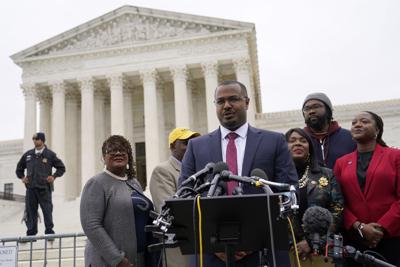Attorney General Jeff Landry’s office and plaintiffs challenging Louisiana’s political maps as discriminatory are both asking courts to revive the dormant cases, after the U.S. Supreme Court issued a surprise ruling this week in favor of Black voters in Alabama.
Landry’s office sent a letter to the Supreme Court asking it to set oral arguments in the case over Louisiana’s congressional maps -- and his lawyers are beginning their effort to argue that the case in Louisiana is different from the bombshell ruling in Alabama.
Landry, a Republican and a leading candidate for governor, is trying to avoid a ruling like the one in Alabama, which would lead the court to force Louisiana to create a second majority-Black congressional district. That would mark a dramatic reversal of fortunes for Democrats in Louisiana, who currently hold just one of the state’s six House seats but would likely pick up one under the new arrangement.
Landry is representing Louisiana Secretary of State Kyle Ardoin, also a Republican, in the cases.
Meanwhile, the NAACP Legal Defense Fund announced Friday it and other plaintiffs are asking the a federal judge in Louisiana’s Middle District court to lift a stay in a case similar to the Alabama one that challenges Louisiana’s state House and Senate maps. Both cases were put on hold while the Alabama case was considered by the Supreme Court.
That challenge is similar to the one brought against the state for its congressional maps. The plaintiffs argue the Republican-drawn maps are racially discriminatory because they dilute the voting power of Black residents.
“These maps have real consequences for my community,” said Dr. Dorothy Nairne, the lead plaintiff. “It is time that Black voters all the way from my neighborhood in Napoleonville up to Baton Rouge and Shreveport are able to finally feel real hope that their voices will be heard in our political process. We are eager to see this vision through in the courts.”
Opponents of Louisiana’s GOP-drawn maps last year hope the Alabama ruling, which upheld decades of precedent in how the courts view racial discrimination in redistricting, bodes well for their court challenges.
Chief Justice John Roberts was joined by Justice Brett Kavanaugh and the court’s three liberals in siding with Black voters in Alabama, issuing a surprise ruling that requires Alabama to draw an additional congressional district with a large Black population.
The cases are remarkably similar. Black voters in Alabama argue the Republican-drawn maps there are discriminatory because while about 25% of residents in that state are Black, only one of seven congressional districts is majority-Black. In Louisiana, Black voters say the maps drawn by the Republican Legislature are discriminatory because while a third of the population is Black, only one of six congressional districts are majority-Black.
Landry’s Solicitor General Liz Murrill wrote in the letter to the court dated Thursday that Louisiana congressional maps that have five of six districts as majority-White have previously been precleared by the Justice Department, which handled such analyses for years. She also wrote that previous maps with two majority-minority districts out of seven -- before Louisiana lost a seat -- have been thrown out as racial gerrymanders by federal courts before.
She wrote that it’s “improbable” that a map with two of six districts being majority-Black could be constitutionally drawn, which distinguishes the case from the Alabama decision.
The Supreme Court’s ruling crucially upheld Section 2 of the Voting Rights Act, which is the bedrock of challenges to redistricting plans on the basis of racial discrimination.

